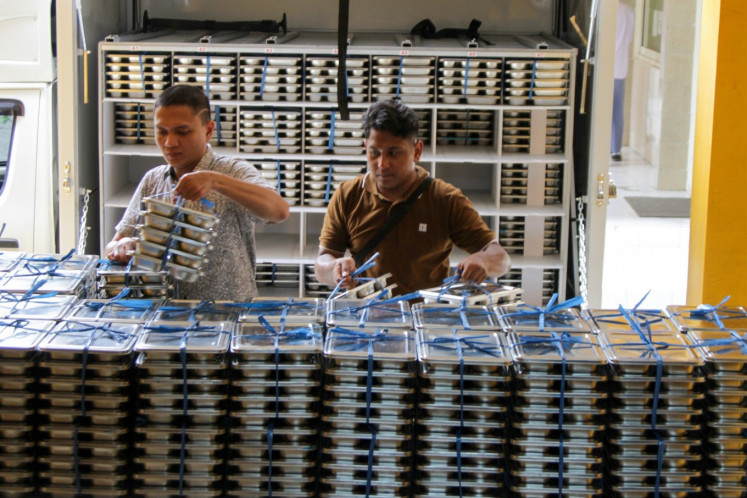Banks aim to up yuan trade finance
Major banks are looking to expand trade finance business in the Chinese yuan in 2014 as China is expected to remain one of Indonesiaâs main trading partners
Change text size
Gift Premium Articles
to Anyone

M
ajor banks are looking to expand trade finance business in the Chinese yuan in 2014 as China is expected to remain one of Indonesia's main trading partners.
Bank Negara Indonesia (BNI), the fourth biggest lender in terms of assets, plans on leveraging its branch in Hong Kong to increase the volume of its yuan-based trade activities, according to BNI international division head Abdullah Firman Wibowo.
Firman said that the state lender had so far carried out the activities in the forms of yuan remittance and yuan letter of credit (L/C).
'On the export side, yuan transactions do occur in the agriculture business sector, while on the import side, they occur in construction and engineering,' he said.
Firman acknowledged that business prospects remained bright this year, supported by higher trade activities between the two countries and the relatively stable exchange rate between the two currencies.
Data from BNI shows that in 2013, Asia was listed as the number one export destination in its trade finance portfolio, making up 68 percent of exports. Among other Asian countries, China sat at the top with 20 percent, equal to around US$1.86 billion.
Asian countries also contributed the most to the import business with 69 percent. China accounted for 18 percent of the contribution, or $1.84 billion, after Japan and Singapore.
Realizing the business potentials between the two countries, Bank Indonesia (BI) announced last October that it had renewed a bilateral currency swap arrangement (BCSA) with the People's Bank of China, in which the two agreed on a $15 billion equivalent rupiah-yuan swap line.
'As businesses between Indonesia and China grow, demand for local currencies will also increase and the BCSA will ensure the supply of rupiah and yuan for businesspeople in the respective countries,' said BI Deputy Governor Perry Warjiyo.
The positive prospects for Indonesia-China trade have also been revealed recently by the Central Statistics Agency (BPS). During the first two months of 2014, China was recorded as Indonesia's largest trading partner in the non-oil and gas export and import segments.
From January to February, export to China totaled $3.41 billion, or 14.3 percent of all exports, and imports from the country stood at $4.93 billion, or 22.7 percent of all imports.
Bank Mandiri's head of transaction banking product group, Andrianto Wahyu Adi, said that China dominated the lender's export and import segments in 2013 with 10 percent and 18 percent contributions, respectively.
The lender began offering yuan services in October 2013, driven by the thriving business prospects.
'The value is still small though. From October until the end of 2013, the value of our outgoing yuan remittance to China stood at less than an equivalent of $1 million and our yuan L/C for imports amounted to less than an equivalent of $20 million,' he said.
He said Mandiri would create its own China desk to grow the yuan business by 100 percent this year.
Separately, HSBC Indonesia's head of global trade and receivable finance Nirmala Salli said that as the second-largest economy in the world and a major country partner for Indonesia, China offers a lot of opportunities. Currently, less than 5 percent of HSBC's global yuan-related trade business originates in Indonesia.
However, despite all the glitziness offered, Firman, Andrianto and Nirmala agreed that two obstacles remained ' lack of customer awareness and relatively tight yuan liquidity in the money market.









